Forging 21st Century Leaders: Strategic Plan 2024-2034
Forging 21st Century Leaders
The Institute's Path Forward Developing & Implementing the Strategic Plan
The VMI experience is a time-tested program that develops cadets into citizen-soldiers. This strategic plan focuses on the initiatives, resources, and infrastructure necessary to positively mold future generations of the VMI graduates into strong, effective leaders, be it within their communities, respective military branch, or chosen profession.
Forging 21st Century Leaders sets five strategic initiatives for the Institute:
- prepare exceptional leaders,
- strengthen academic excellence,
- foster esprit de Corps,
- recruit top cadets & boost success, and
- deliver 21st century facilities.
These five initiatives support our longstanding mission and help us move closer to achieving our vision. The mission and vision remain unchanged—to be an anchor in an ever-changing world.
PLAN INTRODUCTION FROM VMI LEADERSHIP
Maj. Gen. Cedric T. Wins ’85There was no stone left unturned in the development of this plan. Every aspect of cadet life, taking into account the needs of the future and the successes of the past, were considered. This plan reflects input from cadets, faculty, staff, alumni, parents, and many others.”
15th superintendent of VMI

Plan Background: Values & Vision Set the Course
The VMI vision is to be the premier small college in the nation, unequaled in producing educated and honorable citizen-leaders, with a global reputation for academic excellence.
The intent of the Forging 21st Century Leaders Strategic Plan is to shape the Institute’s actions around these initiatives to deliver on the five enduring outcomes of the One Corps - One VMI: A Unifying Action Plan:
- commitment to honor,
- diversity and inclusion,
- the VMI brand,
- competing to win, and
- One VMI.
VMI continues to deliver its unique method of education, thereby producing leaders of character who will positively influence their communities.
Making the Vision a Reality
The process for developing this plan began in 2022, and is built upon the success of previous strategic documents such as Vision 2039 and the One Corps - One VMI: A Unifying Action Plan, as well as the Superintendent’s Initial Planning Guidance, which was developed starting in 2021. Many VMI stakeholders were involved and provided input throughout the process, which included reviewing and reaffirming the mission and vision of the Institute. Focus groups comprised of VMI faculty, staff, members of the Board of Visitors, and cadets met regularly to determine the highest strategic priorities in the areas of military, academics, athletics, and culture. More than 2,400 alumni, parents, cadets, and other VMI stakeholders completed a survey and shared what they believed were the most important aspects of VMI. This valuable input helped shape the future priorities.
In January 2023, the strategic plan steering committee synthesized information from the focus groups and survey to develop the plan priorities and objectives. The VMI Board of Visitors reviewed the draft plan at their April 2023 meeting. The board’s feedback was incorporated, and the resulting strategic plan was considered by the Board of Visitors at a November 2023 meeting. As we work toward our 2039 bicentennial, we envision a VMI that will:
- Grow and retain a Corps strength at operational capacity.
- Be a first-choice destination for talented students, faculty, and staff.
- Retain and graduate cadets at rates that rival the best institutions in the nation.
- Have a leadership and education model that other institutions of higher learning seek to emulate.
- Teach America’s next generation of leaders to think critically and act ethically, and work effectively in teams.
- Develop and graduate honorable men and women who serve with courage and compassion, with a goal of more than half commissioning in the US Armed Forces, and additional quarter serving in other public service roles.
In the implementation of this plan, we are committed to achieving the Institute’s mission by protecting our time-honored culture and traditions and maintaining the elements fundamental to the VMI experience, namely:
- A single-sanction honor system that reinforces integrity and is fair.
- A Class System that promotes accountability and camaraderie,
- A Regimental System that promotes leader development.
- A rigorous academic curriculum that challenges cadets to think critically and encourages ethical reasoning.
- An enduring commitment to preparing graduates for a life of service to the nation and the Commonwealth of Virginia.
VMI Values
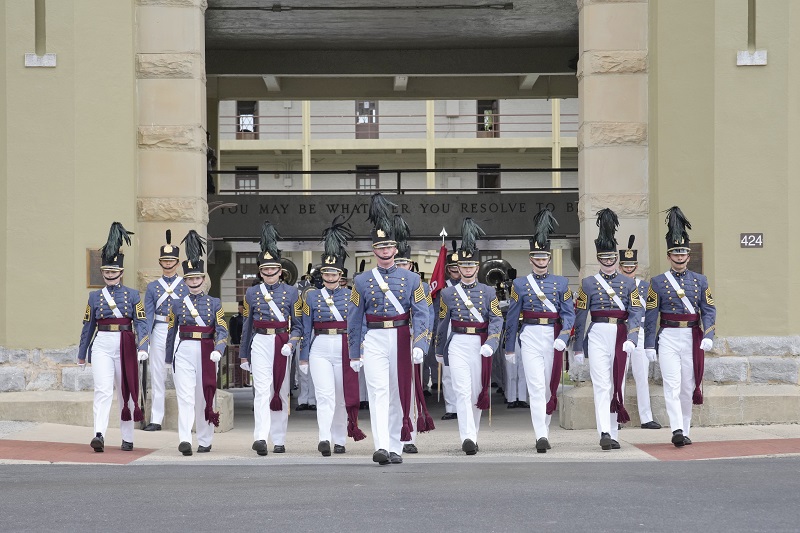
"Built upon the time-honored Institute values of honor, excellence, self-discipline, courage, esprit de corps, and selfless service, the ‘Forging 21st Century Leaders’ strategic plan provides a solid foundation from which the Institute will launch into its third century."
—Tom Watjen ’76, VMI Board of Visitors president during strategic plan development
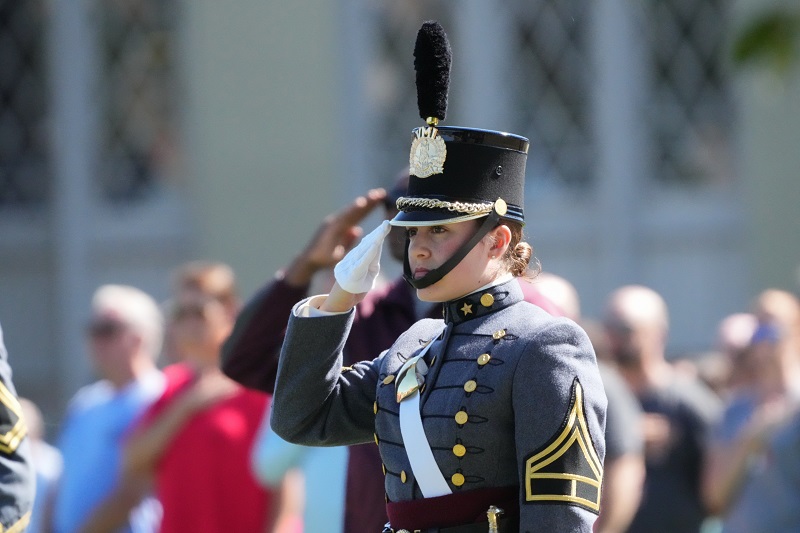
Honor is the heart and bedrock of the VMI experience.
The VMI Honor Code has been fundamental since the school’s beginning in 1839. “A cadet will not lie, cheat, steal, nor tolerate those who do.” VMI’s unique, single-sanction Honor System is foundational to the culture of the Institute. Living the Honor Code establishes the framework for an honorable life.
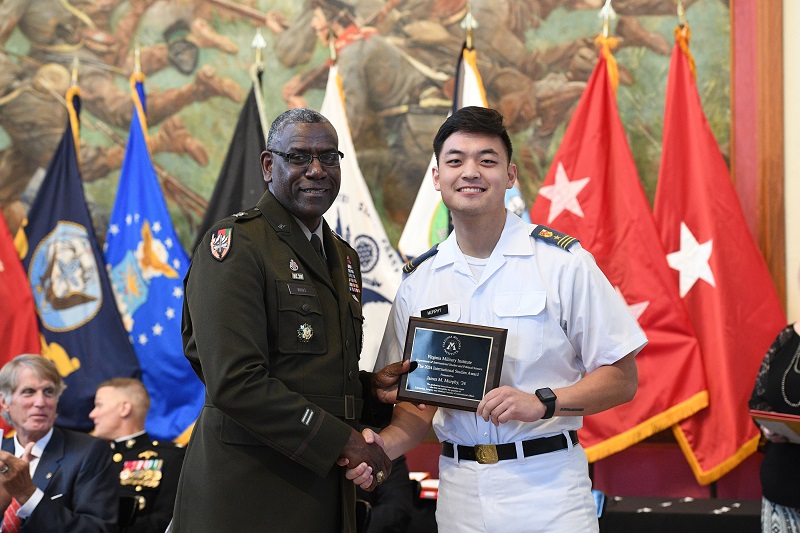
VMI has a long history of excellence.
The VMI experience is predicated on pushing cadets to be the best version of themselves, reaching targets and goals that stretch themselves to new limits. VMI graduates’ noteworthy accomplishments are exemplified through seven Medal of Honor recipients, 11 Rhodes Scholars, one Nobel Peace Prize winner, and one Pulitzer Prize winner.
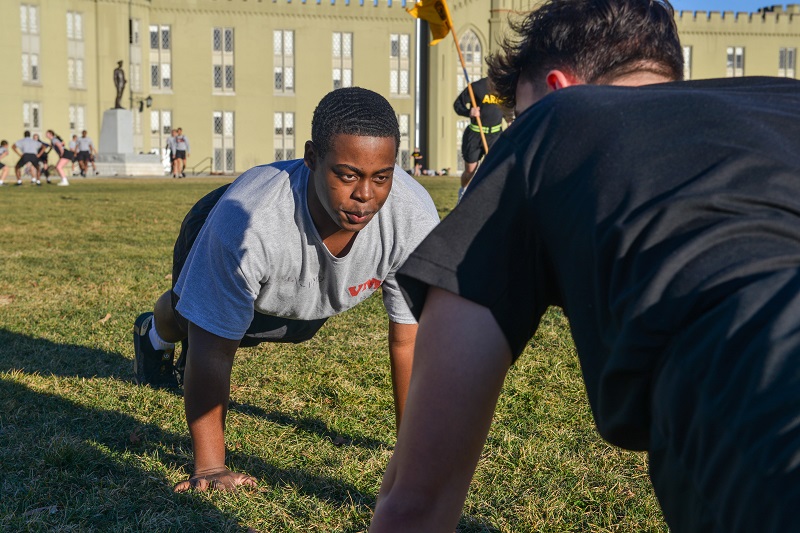
Self-discipline is developed throughout a VMI cadetship.
From sunup to sundown, members of the Corps are responsible for performing the duties of a cadet, including military training, attending classes, studying, parades, competing in NCAA or club athletics, and more, all while managing their time for eating, sleeping, and bonding with their brother rats.
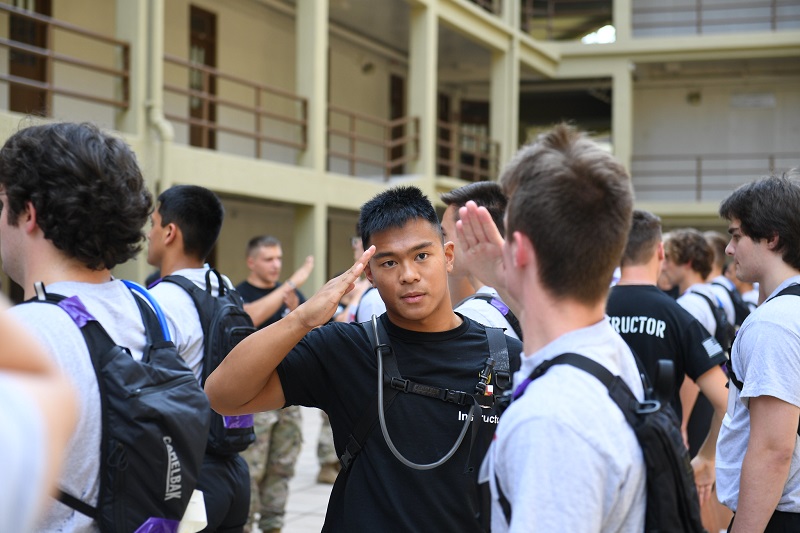
It takes courage to choose the VMI experience.
That courage is an early sign of a successful cadet, and transitions to accepting leadership positions within the Corps of Cadets, standing up for brother rats, training new cadets, speaking up when the VMI Honor Code is violated, and taking the oath to serve within the U.S. armed forces, as a public servant, or in private industry.
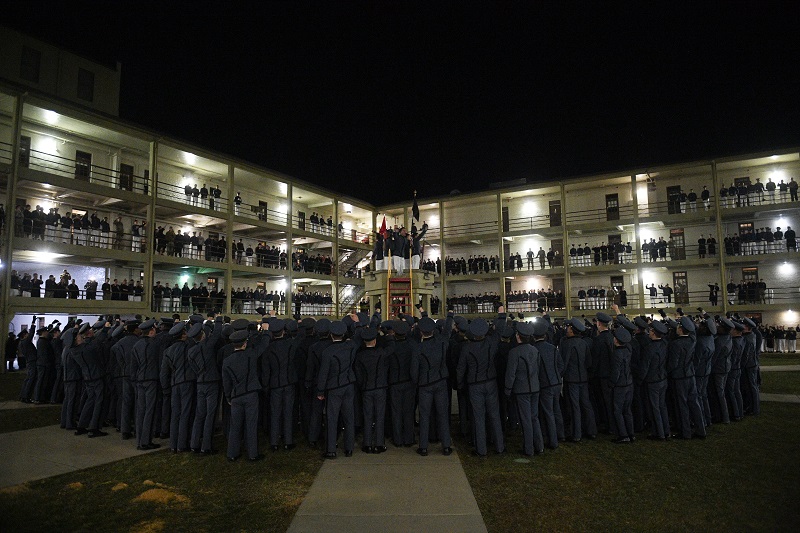
Esprit de Corps: No one is left behind, no one struggles alone.
Although a VMI cadetship is challenging from the start, there is no lack of support in the toughest moments. No single cadet’s challenges are greater than another’s. The characteristics of this strong community attract faculty, staff, and cadets to VMI. Graduates of the Institute remain steadfastly involved and connected to each other and to the Institution.
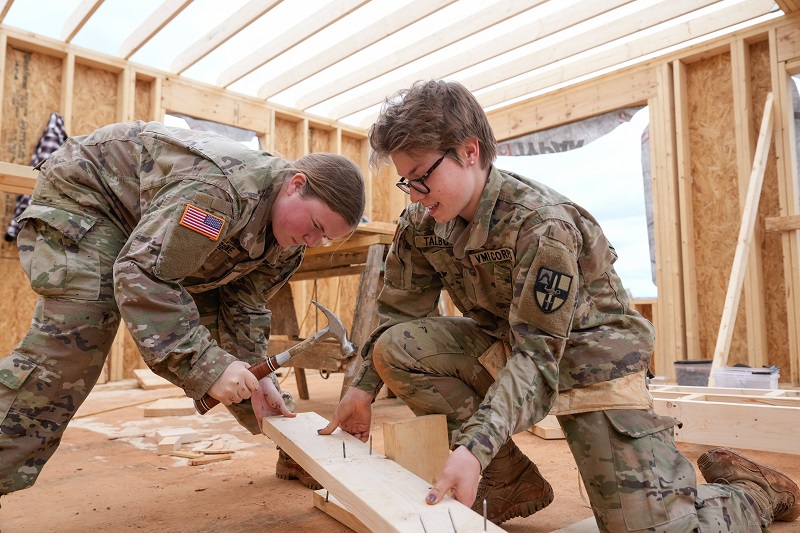
At VMI, self-centered pride takes a backseat to selfless service.
From Matriculation Day to commissioning, where more than half the graduating class joins the U.S. military, selflessness becomes a way of life. They sacrifice time, lead from the front, offer ideas, and develop those around them as they serve. It’s not uncommon to hear of a cadet on furlough, being of service to someone in need.
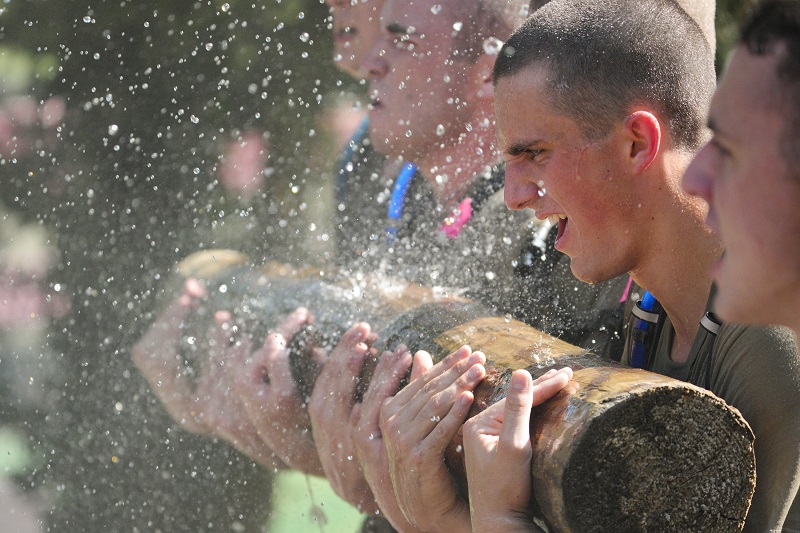
A VMI cadet’s resilience is tested regularly.
Cadets get tired, get knocked down, and take some tough hits, but it’s how they react and recover that makes them special. Cadets face challenges each day on the field of competition, in the classroom, and as they prepare for the battlefield and the boardroom. There’s no fear in failure, but rather a motivation for doing better the next time.
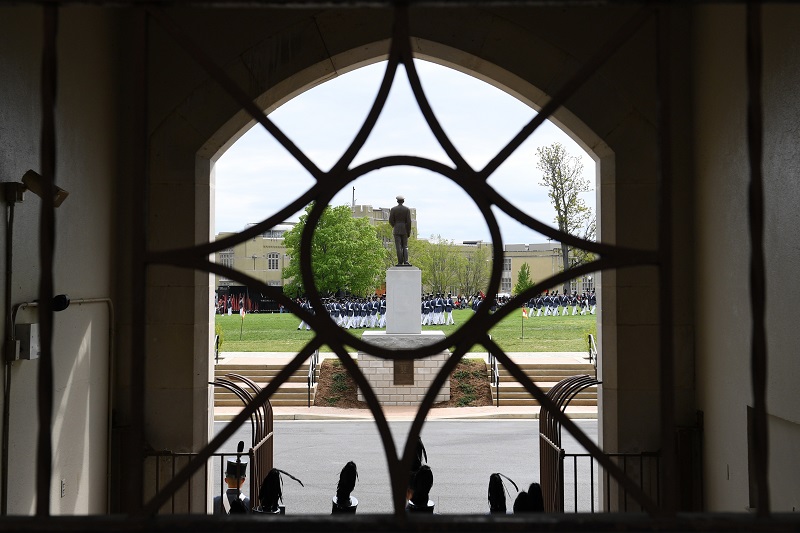
Reflections of One of the Institute's Finest
"This institution gave me not only a standard for my daily conduct among men, but it endowed me with a military heritage of honor and self-sacrifice."
—Gen. George C. Marshall, United States Army, VMI Class of 1901

"Built upon the time-honored Institute values of honor, excellence, self-discipline, courage, esprit de corps, and selfless service, the ‘Forging 21st Century Leaders’ strategic plan provides a solid foundation from which the Institute will launch into its third century."
—Tom Watjen ’76, VMI Board of Visitors president during strategic plan development
Honor is the heart and bedrock of the VMI experience.
The VMI Honor Code has been fundamental since the school’s beginning in 1839. “A cadet will not lie, cheat, steal, nor tolerate those who do.” VMI’s unique, single-sanction Honor System is foundational to the culture of the Institute. Living the Honor Code establishes the framework for an honorable life.
VMI has a long history of excellence.
The VMI experience is predicated on pushing cadets to be the best version of themselves, reaching targets and goals that stretch themselves to new limits. VMI graduates’ noteworthy accomplishments are exemplified through seven Medal of Honor recipients, 11 Rhodes Scholars, one Nobel Peace Prize winner, and one Pulitzer Prize winner.

Self-discipline is developed throughout a VMI cadetship.
From sunup to sundown, members of the Corps are responsible for performing the duties of a cadet, including military training, attending classes, studying, parades, competing in NCAA or club athletics, and more, allwhile managing their time for eating, sleeping, and bonding with their brother rats.

It takes courage to choose the VMI experience.
That courage is an early sign of a successful cadet, and transitions to accepting leadership positions within the Corps of Cadets, standing up for brother rats, training new cadets, speaking up when the VMI Honor Code is violated, and taking the oath to serve within the U.S. armed forces, as a public servant, or in private industry.

Esprit de Corps: No one is left behind, no one struggles alone.
Although a VMI cadetship is challenging from the start, there is no lack of support in the toughest moments. No single cadet’s challenges are greater than another’s. The characteristics of this strong community attract faculty, staff, and cadets to VMI. Graduates of the Institute remain steadfastly involved and connected to each other and to the Institution.
At VMI, self-centered pride takes a backseat to selfless service.
From Matriculation Day to commissioning, where more than half the graduating class joins the U.S. military, selflessness becomes a way of life. They sacrifice time, lead from the front, offer ideas, and develop those around them as they serve. It’s not uncommon to hear of a cadet on furlough, being of service to someone in need.

A VMI cadet’s resilience is tested regularly.
Cadets get tired, get knocked down, and take some tough hits, but it’s how they react and recover that makes them special. Cadets face challenges each day on the field of competition, in the classroom, and as they prepare for the battlefield and the boardroom. There’s no fear in failure, but rather a motivation for doing better the next time.


Reflections of One of the Institute's Finest
"This institution gave me not only a standard for my daily conduct among men, but it endowed me with a military heritageof honor and self-sacrifice."
—Gen. George C. Marshall, United States Army, VMI Class of 1901
